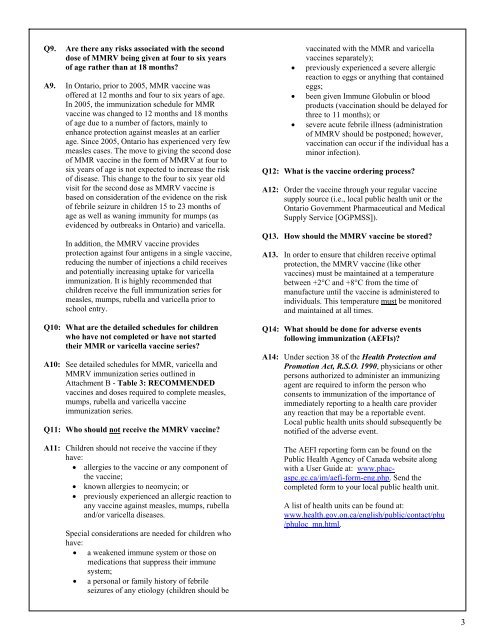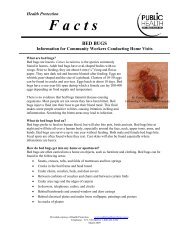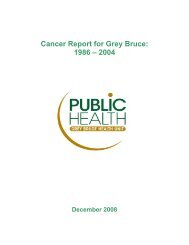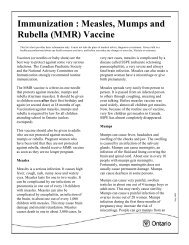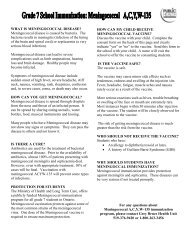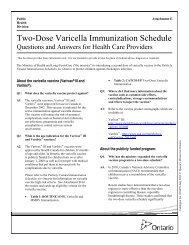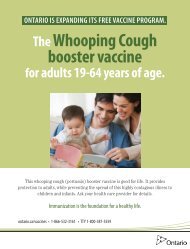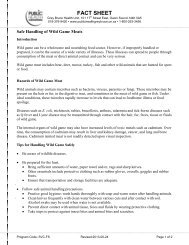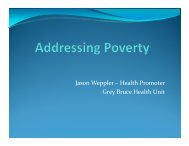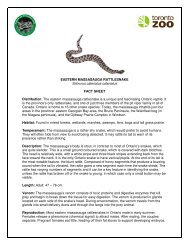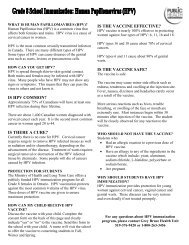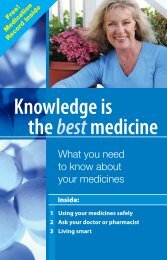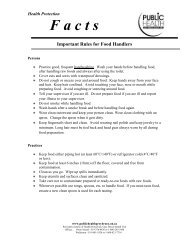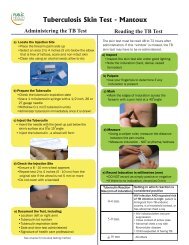Measles-Mumps-Rubella-Varicella (MMRV) Vaccine Program
Measles-Mumps-Rubella-Varicella (MMRV) Vaccine Program
Measles-Mumps-Rubella-Varicella (MMRV) Vaccine Program
You also want an ePaper? Increase the reach of your titles
YUMPU automatically turns print PDFs into web optimized ePapers that Google loves.
Q9. Are there any risks associated with the second<br />
dose of <strong>MMRV</strong> being given at four to six years<br />
of age rather than at 18 months?<br />
A9. In Ontario, prior to 2005, MMR vaccine was<br />
offered at 12 months and four to six years of age.<br />
In 2005, the immunization schedule for MMR<br />
vaccine was changed to 12 months and 18 months<br />
of age due to a number of factors, mainly to<br />
enhance protection against measles at an earlier<br />
age. Since 2005, Ontario has experienced very few<br />
measles cases. The move to giving the second dose<br />
of MMR vaccine in the form of <strong>MMRV</strong> at four to<br />
six years of age is not expected to increase the risk<br />
of disease. This change to the four to six year old<br />
visit for the second dose as <strong>MMRV</strong> vaccine is<br />
based on consideration of the evidence on the risk<br />
of febrile seizure in children 15 to 23 months of<br />
age as well as waning immunity for mumps (as<br />
evidenced by outbreaks in Ontario) and varicella.<br />
In addition, the <strong>MMRV</strong> vaccine provides<br />
protection against four antigens in a single vaccine,<br />
reducing the number of injections a child receives<br />
and potentially increasing uptake for varicella<br />
immunization. It is highly recommended that<br />
children receive the full immunization series for<br />
measles, mumps, rubella and varicella prior to<br />
school entry.<br />
Q10: What are the detailed schedules for children<br />
who have not completed or have not started<br />
their MMR or varicella vaccine series?<br />
A10: See detailed schedules for MMR, varicella and<br />
<strong>MMRV</strong> immunization series outlined in<br />
Attachment B - Table 3: RECOMMENDED<br />
vaccines and doses required to complete measles,<br />
mumps, rubella and varicella vaccine<br />
immunization series.<br />
Q11: Who should not receive the <strong>MMRV</strong> vaccine?<br />
A11: Children should not receive the vaccine if they<br />
have:<br />
• allergies to the vaccine or any component of<br />
the vaccine;<br />
• known allergies to neomycin; or<br />
• previously experienced an allergic reaction to<br />
any vaccine against measles, mumps, rubella<br />
and/or varicella diseases.<br />
Special considerations are needed for children who<br />
have:<br />
• a weakened immune system or those on<br />
medications that suppress their immune<br />
system;<br />
• a personal or family history of febrile<br />
seizures of any etiology (children should be<br />
vaccinated with the MMR and varicella<br />
vaccines separately);<br />
• previously experienced a severe allergic<br />
reaction to eggs or anything that contained<br />
eggs;<br />
• been given Immune Globulin or blood<br />
products (vaccination should be delayed for<br />
three to 11 months); or<br />
• severe acute febrile illness (administration<br />
of <strong>MMRV</strong> should be postponed; however,<br />
vaccination can occur if the individual has a<br />
minor infection).<br />
Q12: What is the vaccine ordering process?<br />
A12: Order the vaccine through your regular vaccine<br />
supply source (i.e., local public health unit or the<br />
Ontario Government Pharmaceutical and Medical<br />
Supply Service [OGPMSS]).<br />
Q13. How should the <strong>MMRV</strong> vaccine be stored?<br />
A13. In order to ensure that children receive optimal<br />
protection, the <strong>MMRV</strong> vaccine (like other<br />
vaccines) must be maintained at a temperature<br />
between +2°C and +8°C from the time of<br />
manufacture until the vaccine is administered to<br />
individuals. This temperature must be monitored<br />
and maintained at all times.<br />
Q14: What should be done for adverse events<br />
following immunization (AEFIs)?<br />
A14: Under section 38 of the Health Protection and<br />
Promotion Act, R.S.O. 1990, physicians or other<br />
persons authorized to administer an immunizing<br />
agent are required to inform the person who<br />
consents to immunization of the importance of<br />
immediately reporting to a health care provider<br />
any reaction that may be a reportable event.<br />
Local public health units should subsequently be<br />
notified of the adverse event.<br />
The AEFI reporting form can be found on the<br />
Public Health Agency of Canada website along<br />
with a User Guide at: www.phacaspc.gc.ca/im/aefi-form-eng.php.<br />
Send the<br />
completed form to your local public health unit.<br />
A list of health units can be found at:<br />
www.health.gov.on.ca/english/public/contact/phu<br />
/phuloc_mn.html.<br />
3


